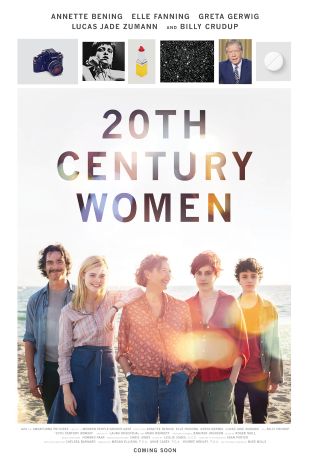
Annette Bening is certainly a gifted actress, but she has a go-to characterization that underpins most of her best roles, as seen in American Beauty, Running With Scissors, and The Kids Are All Right: a flinty, slightly manic enthusiast whose high-gloss polish easily scratches down to a molten, snappish fury. But her performance as Santa Barbara single mom Dorothea Fields in 20th Century Women isn't like that. When the car she and her teenage son Jamie (Lucas Jade Zumann) drove to the supermarket in bursts into flames in the parking lot, she's crestfallen mostly because it was the vehicle that drove him home from the hospital as a baby. Besides, it's a chance to invite the firefighters to her birthday party. She's no Auntie Mame optimist, yet her careworn face suggests that she and the sagging mansion she rents out to boarders have a lot in common: They're both damaged by the march of years, but still grand.
She's done her best by Jamie, making every effort to respect his budding personhood. But now that he's growing inscrutable in mid-adolescence, she worries that he needs outside guidance to mature into a man. Even though there's a perfectly nice handyman (Billy Crudup) living on the premises, she paradoxically recruits two young women already in her son's life to formally assume mentorship duties. One is her tenant Abbie (Greta Gerwig), a magenta-haired photographer who rents a room upstairs and churns out her medical anxieties in late-night slam-dance sessions. The other is Julie (Elle Fanning), Jamie's best friend, a grave-faced blonde who creeps into his room every night to sleep chastely by his side. Jamie, of course, is in love with her, but she won't have sex with him -- in her mind, sex is heartless, a full-body crash into drunk boys, as anonymous and cathartic as Abbie's slam-dancing. And plus, he's been her best friend since forever -- wouldn't sex ruin that? Jamie sees things differently, as 15-year-old boys often do.

Despite the accurate objects of 1979 that fill the house (McCormick spices in old jars, LPs on the stereo, the forgotten sutras of Judy Blume and Our Bodies, Ourselves, the ethereal Lucite mirror-box throne for an E.P.T. pregnancy test), this is not a period piece. It is about the tender edge of now, that ineffable moment when the way things have gotten comfortable slips off of time's smooth shoulders. Dorothea isn't so keen about that. She grimaces after walking in on Abbie and Jamie listening to the Raincoats, and asks: "Can't music just be pretty?" (Remastered Talking Heads and Devo classics are folded into the soundtrack as gently as beaten egg whites in a chiffon-cake batter, their shimmering and alien innovation audible again, as if heard by Dorothea's virgin ears.) She realizes her son is slipping out of the world she made for him and into the world -- a world she won't be a part of for long, especially if she keeps on smoking those cigarettes. "It's all right for me to smoke because they weren't bad for you when I started," she justifies. "They were just stylish." Well, that's how cigarettes always are: stylish when you start, and bad for you later. That's the way time marches on.
Writer/director Mike Mills -- whose previous family drama Beginners (2010) was a loveable portrait of the relationship between a son and his elderly, newly declared gay dad -- makes unusual use of fast-motion photography in many sequences, a choice perhaps inspired by the frenzied time-lapse of the 1982 modernist documentary Koyaanisqatsi (a movie explicitly referenced at one moment). Where most directors re-create the land of memory with dreamy slow-motion, Mills instead compresses full scenes by making the characters scurry around as if in an undercranked silent film -- which, upon further reflection, is closer to how our minds skip-scan through our own selective and compressed memories. Even more idiosyncratically, joyriding trips to punk shows in L.A. are shot with red-green-blue color plates smearing out of sync, the rainbow shuddering of the trees zooming by an expression of the fresh-air joy of the passengers within.

This isn't a melancholy movie, even though it's about the passing of time. The men and women -- but mostly the women -- of this lost era already lament that their lives are not as real as those of Americans who lived in the past. They don't know what's coming, not decades later in our own virtual and fragmented world, nor even one year later, when Reagan will promise a new morning in America. Yet they do know, in ways they can't articulate but can sense, like how birds fly low before a storm. There's a Japanese term that describes this ache: mono no aware, "the pathos of things" -- it's nostalgia's bittersweet sister, meant to be drunk new in the bottle rather than after burnishing golden for years. There is not a single misstep in this poignant, true, and ingenious character drama, an extraordinary film that is one of 2016's best.
